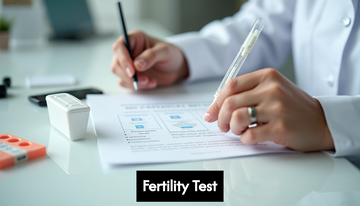Fertility test kits have changed the way people track their reproductive health. The global sperm count is dropping by about 1.4 percent every year. Surprised? Most assume that technology like digital analyzers and video-based sperm analysis are complex and reserved for clinics. The real shock is that these medical-grade tools now fit right into a box you can use at home, offering privacy, clear instructions and advanced accuracy with just a few simple steps.
Table of Contents
- Key Components In Fertility Test Kits
- Choosing The Right Kit For Vasectomy Confirmation
- Understanding Test Results: What Each Component Measures
- Tips For Accurate Use At Home And In Clinics
Quick Summary
| Takeaway | Explanation |
|---|---|
| Fertility Test Kits Empower Users | Comprehensive fertility test kits allow individuals and couples to monitor their reproductive health with precision, featuring vital components for accurate testing and analysis. |
| Vasectomy Confirmation Requires Accurate Kits | Choosing a reliable vasectomy confirmation kit with CLIA-certified laboratory testing and comprehensive analysis of sperm count and motility is crucial for assessing surgical success. |
| Understanding Key Test Results is Essential | Fertility tests provide insights into important parameters such as sperm count, motility, and advanced molecular markers, equipping users to make informed decisions about reproductive health. |
| Preparation and Contamination Prevention are Critical | Following guidelines for sample collection preparation and strict contamination prevention measures maximizes the accuracy and reliability of fertility test results. |
| Documentation Supports Long-Term Health Monitoring | Keeping detailed records of test results facilitates tracking changes over time and enhances communication with healthcare providers, leading to better reproductive health management. |
Key Components in Fertility Test Kits
Fertility test kit components represent a critical technological advancement in personal reproductive health monitoring. These comprehensive diagnostic tools empower individuals and couples to understand their fertility status with precision and discretion.

Collection and Sample Management Tools
A standard fertility test kit includes specialized equipment designed for accurate semen sample collection and preservation. Semen collection containers are engineered to maintain sample integrity, featuring non-reactive materials that prevent contamination or sperm degradation. Most kits provide a non-latex collection method, ensuring compatibility with various user needs and sensitivities.
Typical collection tools include:
- Sterile Collection Cup: Specifically designed to capture the entire ejaculate without compromising sample quality
- Transport Tube: Pre-filled with specialized preservative solution to maintain sperm viability during shipping
- Biohazard Bag: Ensures safe and hygienic transportation of biological samples
According to global fertility research, modern test kits are increasingly focusing on comprehensive analysis beyond basic sperm count. The declining global sperm count trend—approximately 1.4% annually—underscores the importance of these advanced diagnostic tools.
Advanced Testing and Analysis Components
Beyond collection tools, fertility test kits incorporate sophisticated testing mechanisms. These components transform a simple sample into detailed reproductive health insights. A typical kit includes test cassettes or digital analyzers capable of measuring critical fertility parameters such as sperm concentration, motility, and morphology.
Advanced kits now offer comprehensive sperm analysis that goes beyond traditional metrics. Modern testing devices can provide:
- Motile Sperm Concentration (MSC) Measurement
- Video-based Sperm Movement Analysis
- Digital Results Reporting
The integration of digital tools allows users to securely store and share results with healthcare providers, creating a seamless pathway for further medical consultation. Learn more about our home testing approach.

Supplementary Support Materials
Comprehensive fertility test kits recognize that users need more than just testing equipment. Accompanying materials play a crucial role in guiding users through the testing process. Detailed, step-by-step instructions ensure accurate sample collection and submission. Many kits now include QR codes or digital registration processes that link physical testing to secure online platforms.
Support materials typically encompass:
- Detailed Instruction Booklet
- Return Shipping Label
- Online Registration Information
- Privacy Protection Guidelines
These components collectively transform fertility testing from a complex medical procedure into an accessible, user-friendly experience. By providing medical-grade diagnostic capabilities within a home testing framework, fertility test kits democratize reproductive health understanding and empower individuals to take proactive steps in their fertility journey.
Choosing the Right Kit for Vasectomy Confirmation
Vasectomy confirmation requires precision, discretion, and reliable testing methods. Selecting the appropriate test kit can significantly impact the accuracy of post-procedure fertility assessment and patient peace of mind.
Key Criteria for Vasectomy Confirmation Kits
The selection of a vasectomy confirmation kit demands careful consideration of multiple factors. Accuracy and reliability stand as the paramount concerns for patients seeking definitive proof of surgical success. The American Urological Association recommends comprehensive post-vasectomy semen analysis as the gold standard for confirming sterility.
Critical selection criteria include:
- Laboratory Certification: Ensure the kit uses CLIA-certified laboratory testing
- Comprehensive Analysis: Look for kits that provide detailed sperm count and motility assessment
- User-Friendly Design: Select kits with clear instructions and simple collection processes
Understand your vasectomy confirmation options to make an informed decision about your reproductive health.
Specialized Components for Accurate Testing
A high-quality vasectomy confirmation kit goes beyond basic sample collection. According to PVSA guidelines, an ideal kit should include specialized components that ensure sample integrity and accurate testing. These typically encompass precision tools designed to maintain sample quality during transportation and analysis.
Essential kit components include:
- Preservative-Treated Collection Container: Maintains sperm sample viability
- Pre-Addressed Shipping Materials: Simplifies the return process
- Detailed Instruction Manual: Guides users through precise sample collection
Patient compliance remains a significant challenge in post-vasectomy testing. The right kit can dramatically improve follow-through by removing barriers to testing and providing a straightforward, discrete process.
Interpreting Test Results and Next Steps
Choosing the right kit is only half the journey. Understanding the results requires careful interpretation and potentially additional medical consultation. The goal of vasectomy confirmation is absolute certainty about reproductive status.
Most comprehensive kits provide:
- Detailed Digital Report
- Professional Analysis
- Clear Interpretation Guidelines
Statistics from urological research indicate that approximately 2-3% of vasectomies may not be immediately successful, highlighting the critical nature of thorough post-procedure testing. Learn how to interpret your test results to ensure complete understanding of your reproductive status.
The ideal vasectomy confirmation kit transforms a potentially stressful medical procedure into a straightforward, private, and empowering experience. By prioritizing accuracy, ease of use, and comprehensive reporting, patients can confidently verify their surgical outcome and move forward with peace of mind.
Understanding Test Results: What Each Component Measures
Fertility test results provide a comprehensive snapshot of reproductive health, offering insights far beyond simple numeric measurements. Understanding these complex parameters empowers individuals to make informed decisions about their reproductive potential.
Sperm Count and Concentration Analysis
Sperm count represents the fundamental metric in male fertility assessment. According to research from MyLabBox, modern fertility test kits measure sperm concentration with remarkable precision. A standard analysis typically reports the total number of sperm per milliliter of semen, which serves as a critical indicator of reproductive capability.
Key factors in sperm count evaluation include:
- Total Sperm Count: Number of sperm in the entire ejaculate
- Concentration Levels: Sperm density per milliliter
- Reference Range Comparison: How results compare to clinical standards
Explore detailed semen analysis insights to better understand your reproductive health metrics.
Sperm Motility and Quality Assessment
Beyond quantity, sperm quality plays a crucial role in fertility potential. University research highlights that sperm motility—the ability of sperm to move effectively—is equally important as total count. Advanced test kits now provide detailed movement analysis, categorizing sperm into different mobility classifications.
Motility assessment typically includes:
- Progressive Motility: Sperm moving forward in a direct path
- Non-Progressive Motility: Sperm movement without forward progression
- Immotile Sperm: Sperm showing no movement
Modern testing techniques can even provide video analysis of sperm movement, giving users unprecedented insights into reproductive health.
Protein and Molecular Markers
Cutting-edge fertility testing goes beyond traditional measurements. Specialized tests now analyze molecular markers like SP-10, a protein present in sperm cells that provides additional diagnostic information. These advanced markers help differentiate between various fertility conditions and offer more nuanced understanding of reproductive potential.
Molecular marker analysis can reveal:
- Protein Concentration Levels
- Genetic Fertility Indicators
- Potential Reproductive Challenges
The comprehensive nature of modern fertility test kits transforms what was once a complex medical procedure into an accessible, informative experience. By providing detailed, actionable information, these tests empower individuals to take proactive steps in their reproductive health journey.
Whether confirming a vasectomy or investigating fertility potential, understanding these intricate measurements offers clarity and confidence. Discover more about interpreting your test results to gain deeper insights into your reproductive health.
Tips for Accurate Use At Home and in Clinics
Accurate fertility testing requires precision, careful preparation, and meticulous attention to detail. Whether using a home test kit or visiting a clinical setting, understanding the nuanced process can significantly impact the reliability of your results.
Sample Collection Preparation
Proper preparation is the cornerstone of accurate fertility testing. Research from Proov recommends a specific abstinence period of 2-5 days before sample collection. This timeframe ensures optimal sperm concentration and motility, providing the most representative analysis of reproductive health.
Key preparation guidelines include:
- Abstinence Duration: Maintain 2-5 days between ejaculations
- Avoid Lubricants: Do not use standard lubricants that can harm sperm
- Hygiene Considerations: Thoroughly wash hands and collection area
Learn more about precise sample collection techniques to maximize testing accuracy.
Collection Technique and Contamination Prevention
Contamination represents a significant risk in fertility testing. According to MyLabBox research, even minor external factors can compromise sample integrity. Users must follow a strict protocol to maintain sample quality and ensure reliable results.
Critical contamination prevention steps:
- Sterile Environment: Use provided sterile collection containers
- Temperature Sensitivity: Maintain sample at recommended temperature
- Rapid Processing: Submit sample within specified timeframe
- Avoid External Substances: No additional liquids or materials
Professional laboratories utilize strict protocols to minimize variability. Home testing requires equal diligence to replicate clinical-grade accuracy.
Documentation and Follow-up Procedures
Comprehensive documentation transforms a simple test into a meaningful diagnostic tool. Accurate record-keeping allows for tracking changes over time and provides valuable insights for healthcare providers. Each test should be treated as a data point in a broader reproductive health assessment.
Documentation best practices:
- Detailed Logging: Record collection time and conditions
- Previous Result Comparison: Track changes across multiple tests
- Healthcare Communication: Share results with medical professionals
Whether confirming a vasectomy or exploring fertility potential, meticulous approach ensures the most reliable outcomes. Discover comprehensive testing strategies to support your reproductive health journey.
By combining scientific precision with careful methodology, individuals can transform home fertility testing from a simple procedure into a powerful diagnostic tool. Understanding and implementing these guidelines empowers users to take control of their reproductive health with confidence and accuracy.
Frequently Asked Questions
What are the key components of a fertility test kit?
A fertility test kit typically includes collection tools like a sterile collection cup, advanced testing components such as test cassettes or digital analyzers, and supplementary support materials including detailed instructions and return shipping information.
How can I choose the right kit for vasectomy confirmation?
When selecting a vasectomy confirmation kit, look for CLIA-certified laboratory testing, comprehensive sperm count and motility analysis, and ensure that the kit comes with clear instructions for easy use.
What do the test results of a fertility test kit indicate?
Test results from fertility test kits can provide insights into sperm count, motility quality, and advanced molecular markers, helping individuals understand their reproductive health and potential fertility issues.
What precautions should I take when using a fertility test kit at home?
To ensure accurate results, it’s important to follow sample collection preparation guidelines, maintain a sterile environment during collection, and carefully document the testing process to track any changes over time.





